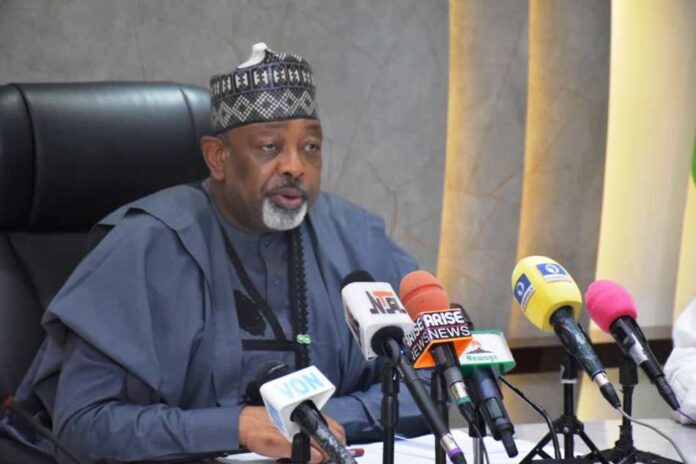
The Hon. Minister of Agriculture and Food Security, Sen. Abubakar kyari, CON, revealed that the federal government is taking proactive steps to introduce zinc rice varieties, Faro 71 and 72, to enhance food and nutrition safety.
The Minister disclosed this while briefing on the official release of Biofortified Zinc Rice Varieties in Nigeria, held in the Ministry’s conference room in Abuja, recently.
He revealed that the Zinc Rice Varieties, Faro 71 and Faro 72 will address key challenges in rice production and significantly contribute to food and nutrition security for Nigeria’s smallholder farmers, who depend on rice for both sustenance and income.
In his words, “these varieties not only offer higher zinc content and yield but also climate resilience such as adaptability to Savanna and Rainforest ecologies, Drought tolerance and Pest and disease resistance, which make them a valuable tool for enhancing both the productivity and resilience of rice farming systems in vulnerable communities”.
The Minister pointed out that Zinc deficiency is a significant public health issue in Nigeria, contributing to poor nutrition outcomes, especially among women and children, adding that Zinc is a vital micronutrient required for immune function, growth, cognitive development, and overall well-being.
“Yet, a large proportion of the Nigerian population does not meet their daily zinc requirements due to diets that are predominantly low in bioavailable micronutrients.
Nutrition surveys and global health reports have it that anaemia affects about 68% of children under five in Nigeria, with zinc and iron deficiencies being major underlying causes. The national stunting prevalence among children under five in Nigeria is 37%, “the Minister noted.
He further stated that proper nutrition was essential for the survival of the human race, as the future of our generation is dependent upon our children.
Sen. Kyari re-emphasized that Zinc deficiency weakens immune systems, increasing the risk of infections, stunted growth, and delayed development in children, pointing out that inadequate dietary intake of zinc contributes to maternal health issues, poor birth outcomes, and reduced work capacity in adults.
He said that to address this, Nigeria is taking proactive steps by introducing biofortified, zinc-enriched staple crops, such as zinc rice, offering affordable, accessible solutions to improve dietary zinc intake and strengthen food and nutrition security.
The Minister noted that through a strategic collaboration between the Ministry and HarvestPlus, HarvestPlus Solutions, and the National Cereals Research Institute (NCRI), Nigeria has achieved a historic milestone with the release of Faro 71 and Faro 72 – the first biofortified, zinc-enriched rice varieties in both Nigeria and Africa.
Kyari pointed out that this remarkable achievement was made possible through the support of the Foreign, Commonwealth & Development Office (FCDO) of the British Government, the Propcom+ Project, and the Alliance for a Green Revolution in Africa (AGRA), whose innovative funding for agricultural development in Nigeria has been instrumental in making the progress a reality.
According to him, “This breakthrough builds on successful scaling efforts in Bangladesh and India, where farming households growing zinc-enriched rice have recorded measurable improvements in nutrition outcomes through increased production and consumption”.
He added that an affordable, accessible dietary source of zinc, these enriched rice varieties can meet up to 40% of daily zinc requirements when consumed regularly, making them a practical and proven solution to combat zinc deficiency and improve cognitive health, especially among adolescents.
The Minister further stated that beyond its nutritional benefits, zinc-enriched rice offers sustainable, innovative market opportunities for smallholder farmers, helping them improve their livelihoods while supplying healthier, nutrient-dense food to Nigerian and African consumers.
He therefore, assured Nigerians that the Federal Ministry of Agriculture and Food Security and Harvest plus will continue to work alongside public institutions, private companies, and national partners to promote the widespread adoption and scaling of the nutri-cereals.
Earlier, the Permanent Secretary in the Ministry, Dr Marcus Ogunbiyi, expressed delight that Nigeria has achieved a remarkable milestone in the agricultural innovation space, emerging as Africa’s first nation to successfully develop zinc biofortified rice.
He noted that rice which is majorly grown and consumed in Nigeria have essential elements like macronutrients embedded in it and being a major staple food in the country the Ministry is concerned about strengthening food and nutrition safety in the county.
In his remarks, Harvestplus Country Director, Dr. Yusuf Dollah said that the organisation is working with National Cereals Research Institute at the moment, and they are producing early generational seeds.
He added that the Institute would be ready to integrate the commercial seed components into the seeds system for free to enable farmers to multiply into the certified seeds that will be required for planting.
Dr Yusuf also pointed out that his organisation intend to work with partners to run demonstrations, demand creation activities amongst others, noting that Harvest plus has three phases namely; Research and Development (which led to the release of the varieties), Commercialisation which the Organisation is about going into and are ready to provide support to ensure that Nigerians will continuously have access to the nutritious varieties and the prices with the other conversational varieties is the same.
In attendance were the Country Representatives of Harvestplus Solutions, Propcom, Biofarm, NCRI, and AGRA, amongst others.
Signed
Eremah Anthonia (Mrs.)
Chief Information Officer
For Director Information
29/4/2025





